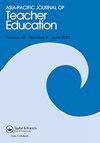Empowering mathematics teachers to meet evolving educational goals: the role of “epistemic objects” in developing actionable practice knowledge in tumultuous times
IF 1.6
3区 教育学
Q2 EDUCATION & EDUCATIONAL RESEARCH
引用次数: 1
Abstract
ABSTRACT In recent decades, the aims and objectives of education – and therefore public discourse on the appropriate skills and attributes of mathematics teachers – have been rapidly shifting due to forces from outside the teaching profession. The forces driving change in mathematics are as diverse as the emergence of “Industry 4.0” and “STEM,” new directions in transnational education policy making, and the COVID-19 pandemic. This paper contributes to a growing literature seeking to empower teachers to respond to the complexity of such multifaceted change expansively rather than defensively. It does so through the refinement and application of practical theories of educational change and approaches to building actionable practice knowledge. Specifically, this paper will argue for the use of the epistemic object as a practical focus for changes to practice chosen by the profession. This argument will be made within the framework of practice architectures offered by Kemmis and others. The paper first considers the impact of some recent disruptions on teaching and then provides a “worked example” of using mathematical proficiencies as an epistemic object able to practically support teachers to develop actionable knowledge grounded in the specifics of their own professional context.赋予数学教师能力,以满足不断变化的教育目标:“认知对象”在动荡时期发展可操作的实践知识中的作用
近几十年来,由于来自教学专业之外的力量,教育的目的和目标——以及关于数学教师的适当技能和属性的公共话语——正在迅速发生变化。推动数学变革的力量多种多样,如“工业4.0”和“STEM”的出现,跨国教育政策制定的新方向,以及COVID-19大流行。本文有助于越来越多的文献寻求授权教师应对这种多方面的变化的复杂性,而不是防御。它通过改进和应用教育变革的实践理论和方法来建立可操作的实践知识。具体而言,本文将论证使用认识论对象作为专业选择的实践变化的实践焦点。这个论点将在Kemmis和其他人提供的实践架构框架内进行。本文首先考虑了最近一些中断对教学的影响,然后提供了一个使用数学熟练度作为认识对象的“工作示例”,该对象能够实际支持教师根据自己的专业背景发展可操作的知识。
本文章由计算机程序翻译,如有差异,请以英文原文为准。
求助全文
约1分钟内获得全文
求助全文
来源期刊

Asia-Pacific Journal of Teacher Education
EDUCATION & EDUCATIONAL RESEARCH-
CiteScore
4.40
自引率
7.70%
发文量
29
期刊介绍:
This journal promotes rigorous research that makes a significant contribution to advancing knowledge in teacher education across early childhood, primary, secondary, vocational education and training, and higher education. The journal editors invite for peer review theoretically informed papers - including, but not limited to, empirically grounded research - which focus on significant issues relevant to an international audience in regards to: Teacher education (including initial teacher education and ongoing professional education) of teachers internationally; The cultural, economic, political, social and/or technological dimensions and contexts of teacher education; Change, stability, reform and resistance in (and relating to) teacher education; Improving the quality and impact of research in teacher education.
 求助内容:
求助内容: 应助结果提醒方式:
应助结果提醒方式:


